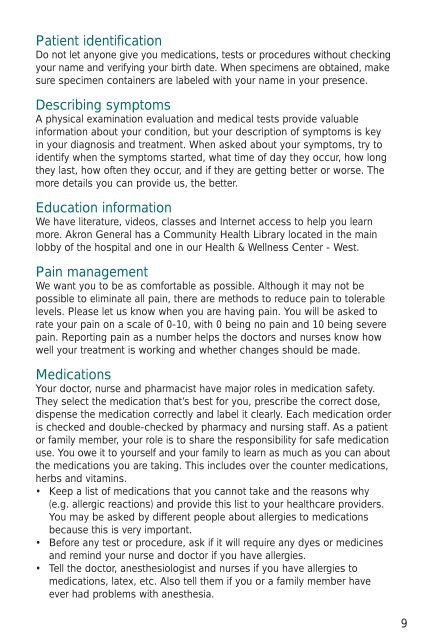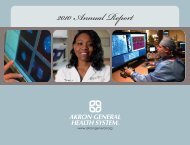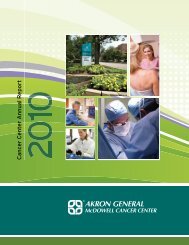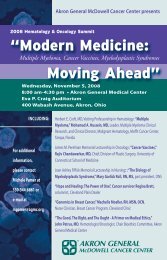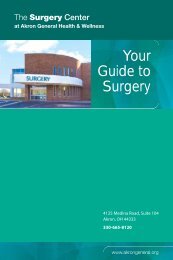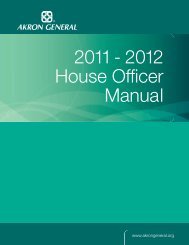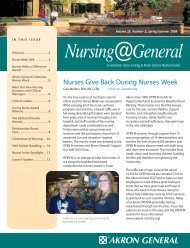Your Guide to Surgery - Akron General Medical Center
Your Guide to Surgery - Akron General Medical Center
Your Guide to Surgery - Akron General Medical Center
Create successful ePaper yourself
Turn your PDF publications into a flip-book with our unique Google optimized e-Paper software.
Patient identification<br />
Do not let anyone give you medications, tests or procedures without checking<br />
your name and verifying your birth date. When specimens are obtained, make<br />
sure specimen containers are labeled with your name in your presence.<br />
Describing symp<strong>to</strong>ms<br />
A physical examination evaluation and medical tests provide valuable<br />
information about your condition, but your description of symp<strong>to</strong>ms is key<br />
in your diagnosis and treatment. When asked about your symp<strong>to</strong>ms, try <strong>to</strong><br />
identify when the symp<strong>to</strong>ms started, what time of day they occur, how long<br />
they last, how often they occur, and if they are getting better or worse. The<br />
more details you can provide us, the better.<br />
Education information<br />
We have literature, videos, classes and Internet access <strong>to</strong> help you learn<br />
more. <strong>Akron</strong> <strong>General</strong> has a Community Health Library located in the main<br />
lobby of the hospital and one in our Health & Wellness <strong>Center</strong> - West.<br />
Pain management<br />
We want you <strong>to</strong> be as comfortable as possible. Although it may not be<br />
possible <strong>to</strong> eliminate all pain, there are methods <strong>to</strong> reduce pain <strong>to</strong> <strong>to</strong>lerable<br />
levels. Please let us know when you are having pain. You will be asked <strong>to</strong><br />
rate your pain on a scale of 0-10, with 0 being no pain and 10 being severe<br />
pain. Reporting pain as a number helps the doc<strong>to</strong>rs and nurses know how<br />
well your treatment is working and whether changes should be made.<br />
Medications<br />
<strong>Your</strong> doc<strong>to</strong>r, nurse and pharmacist have major roles in medication safety.<br />
They select the medication that’s best for you, prescribe the correct dose,<br />
dispense the medication correctly and label it clearly. Each medication order<br />
is checked and double-checked by pharmacy and nursing staff. As a patient<br />
or family member, your role is <strong>to</strong> share the responsibility for safe medication<br />
use. You owe it <strong>to</strong> yourself and your family <strong>to</strong> learn as much as you can about<br />
the medications you are taking. This includes over the counter medications,<br />
herbs and vitamins.<br />
• Keep a list of medications that you cannot take and the reasons why<br />
(e.g. allergic reactions) and provide this list <strong>to</strong> your healthcare providers.<br />
You may be asked by different people about allergies <strong>to</strong> medications<br />
because this is very important.<br />
• Before any test or procedure, ask if it will require any dyes or medicines<br />
and remind your nurse and doc<strong>to</strong>r if you have allergies.<br />
• Tell the doc<strong>to</strong>r, anesthesiologist and nurses if you have allergies <strong>to</strong><br />
medications, latex, etc. Also tell them if you or a family member have<br />
ever had problems with anesthesia.<br />
9


